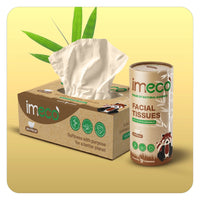walk into a store and pick up a product that says “eco-friendly” and “BPA free.” You feel proud that you are making a better choice for you and for the planet. But as you glance around, you notice other products with similar claims. How do you know which ones are actually good?
This is the challenge of greenwashing. Across India and the world, companies often exaggerate their environmental efforts or make claims that are hard to verify. The result is confusion for conscious shoppers, delayed climate action, and slower progress toward a sustainable future.
At Ecoconsious, we know that sustainability is not just a label. It is a journey, and it starts with honesty. We want our customers to feel confident that their choices truly make a difference.
What Greenwashing Looks Like
Greenwashing can appear in many ways. According to the UN, some companies make big promises about reducing emissions or being eco-friendly without having a real plan to deliver. Labels like “green” or “sustainable” are often used without clear explanations, and sometimes brands highlight one small positive change while ignoring the larger environmental impact of their products.
Nearly 60% of claims were found to be misleading in the fashion industry in Europe.
The truth is that greenwashing is more than a marketing problem. It is a barrier to tackling climate change. Misleading claims divert attention from genuine solutions and make it harder for people to act responsibly.
Why It Matters for Climate Change
The reason behind it is clear. Human activities, especially emissions of carbon and methane, are heating the planet. This is causing floods, droughts, storms, and heatwaves. To limit climate change, emissions need to be halved by 2030 and reach net zero by 2050.
In a situation like this, every small step counts, and delays caused by greenwashing make it harder to meet these targets.
As Catherine McKenna, chair of the UN High-Level Expert Group on Net-Zero Emissions, said,
“To avert a climate catastrophe, we need bold pledges matched by concrete, measurable action.”
Image: UN
How to Spot Greenwashing
Even the most conscious shopper can be confused by green claims. Here are some practical ways to identify greenwashing in India:
- Look for specific details instead of vague terms like “eco-friendly” or “green”
- Check for credible certifications recognised internationally or in India, such as FSC, B Corp, or Fair Trade
- Consider the full lifecycle of the product, from raw materials to disposal
- Compare brands to see which are truly transparent about their practices
- Be cautious of very cheap products that claim to be sustainable without evidence
Asking simple questions like “What exactly is green about this?” can help you make better choices for yourself and the planet.
How Ecoconsious is Making a Difference in India
At Ecoconsious, we approach sustainability with honesty, transparency, and practicality. We know that making eco-friendly choices needs to be easy, affordable, and meaningful for Indian consumers.
Here is how we try to make a real difference:
- Transparency and accountability: We openly share details about our sourcing, materials, and production so you know the true impact of your choices.
- Durable and reusable products: Our products are built to last, helping reduce the enormous plastic waste problem in India.
- BPA-free and safe: All our products are made from non-toxic materials, giving you safer options for daily use at home, work, or school.
- Travel-friendly and practical: Designed for everyday Indian life, whether commuting, working, or going on trips.
- Educating and empowering customers: We want every customer to understand the full lifecycle of our products and the difference they make.
Unlike products that focus on marketing tricks, our Ecoconsious product is designed with the full sustainability journey in mind. Our goal is to make it easy for Indian consumers to take responsible, impactful steps every day.









